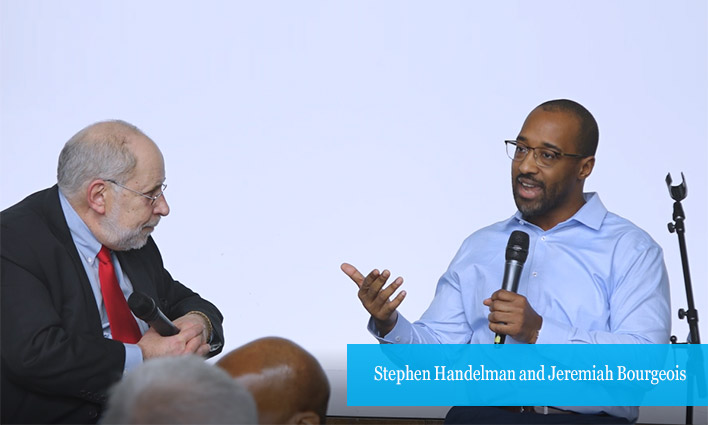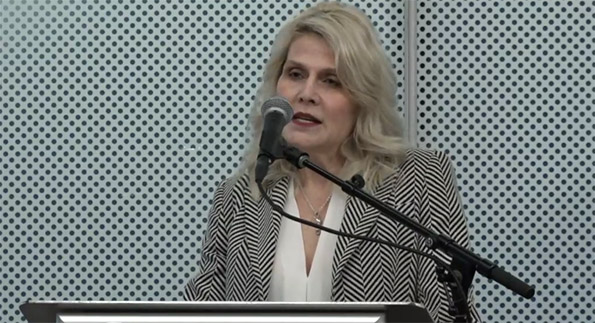
Is America ready for prison reform? That was the central question at the 15th annual John Jay/Harry Frank Guggenheim Symposium on Crime in America on February 20 and 21. The two-day event shined a spotlight on prison reform and the innovative ways states across the country are creating meaningful change. Researchers, scholars, policymakers, and journalists came together to explore how changing the culture of incarceration and taking on rehabilitative approaches could reduce recidivism and increase positive transitions back into society for criminal justice-involved individuals.
“Society has a fundamental interest in ensuring that incarceration systems contribute to successful reentry and reintegration because successful reentry reduces recidivism, it increases public safety and frees up resources to meet other public needs.” —Leann Bertsch
Changing the Prison Culture
Leann Bertsch, Director of the North Dakota Department of Corrections and Rehabilitation, kicked off the symposium by sharing how North Dakota’s correction system went from a punitive approach to one focused on repair. “Over the past several decades this country has become numb to a bloated prison system. The only way we can get around the pain of knowing that 2.3 million people are behind bars today is by telling ourselves that people in prison deserve retribution. This is a dangerous line of thinking if we allow it to justify a prison system that terrorizes and traumatizes millions of people a year, who are disproportionately Black, brown, and low income, without providing pathways to rehabilitation,” said Bertsch who believes there is growing support for a less punitive approach.

“Incarceration systems should value and respect the dignity of incarcerated individuals, staff, victims and survivors of crimes, as well as the families and communities with a stake in the individual's successful reentry. Society has a fundamental interest in ensuring that incarceration systems contribute to successful reentry and reintegration because successful reentry reduces recidivism, it increases public safety, and frees up resources to meet other public needs.” She then noted how language played a major part in changing the culture at the North Dakota Department of Corrections and Rehabilitation. “So, how have we changed? By showing respect for prisoners and their property; avoiding the casual use of swear words; calling prisoners by mister and misses or their first names, and saying sorry when something goes wrong. This ought to be second nature in every prison in the country. Language matters.”
Transitioning Back to Society
Offering the attendees a glimpse at what reintegration looks like was Jeremiah Bourgeois, a formerly criminal justice-involved individual who served 27 years and was released last October. Bourgeois, who is also a columnist for the Crime Report, sat down with Stephen Handleman, Director of the Center on Media, Crime and Justice (CMCJ), for a Q&A session, where he discussed being sentenced to a life term at the age of 14 and the emotional difficulty of transitioning from prison back to the real world. “What’s interesting is that the joy and the sense of ‘Wow, I’m really here’ has not really come for me. And, that’s shocking to a lot of people that I talk to who are still confined. Because you get this idea in your head, especially during a life sentence that if only I were free, if only I could got out there, that would be so amazing; and I’m here and it doesn’t feel amazing,” admitted Bourgeois, searching for a reason why. “In order to do something seemingly extraordinary in the prison environment, you have to learn to disassociate. I could not let what was happening around me affect what I was trying to do or what my vision was. But in doing that, in order not to feel pain, you’re not going to feel pleasure either. And so I think I did that for so many years, that I'm just not feeling the wonders of actually being here now.”

“In order to do something seemingly extraordinary in the prison environment, you have to learn to disassociate.” —Jeremiah Bourgeois
Where Bourgeois is finding a sense of wonder—and outlet for his thoughts—is through writing. While in prison, he found empowerment through writing, realizing it was how he could best advocate for himself. “My writing started because I was just trying to communicate my needs in a bureaucracy where nothing is going to get done, unless you write it,” he said, adding that he learned he had to write in the simplest, clearest fashion for efficacy. Using books he had access to, he learned how to structure sentences, where to place punctuation marks in a sentence, and how to tell a story. “It was a strange way to learn how to write, and I can assure you I didn’t know I was an effective writer, but it worked.” The writing led Bourgeois to earn his GED while in prison and acquire his bachelor’s degree through distance learning. Currently, he’s prepping for the LSAT while working as a paralegal. A collection of his prison writings, The Extraordinary Ordinary Prisoner: Essays from Inside America’s Carceral State, was published earlier this year.
“By its very nature, the design of the prison system does not encourage virtuous, responsible behavior.” —James McGreevy
Building Reentry Programs
On day two, former New Jersey governor James McGreevy, now Chairman of the New Jersey Reentry Corporation (NJRC), spoke of the importance of effective reentry programs and the need for radical change in the prison system. “By its very nature, the design of the prison system does not encourage virtuous, responsible behavior. For the vast majority of those in prison, it’s bad, it’s harmful, and it’s only going to make that person’s behavior more destructive and harmful to the community,” said McGreevy. Through his work with the Exodus Transitional Ministry in Harlem, New York, McGreevy has a clearer understanding of the negative impact the system has on individuals. “I was working with guys that had done time in prison and they were struggling. They were struggling coming home; they struggled financially, they couldn’t find jobs; and they struggled within their relationships,” he said, pointing to how this knowledge led to fostering a reentry program that provides services for formerly criminal justice-involved individuals.

“If 97 percent of the individuals in prisons are coming home, instead of harming them, let’s start helping them earlier to be the persons that they ought to be within the communities that they know, and the families that they love.” — James McGreevy
At NJRC, former criminal justice-involved individuals have access to addiction treatments, job training and employment opportunities, and mental health and medical care; but McGreevy knows that may not be enough due to the current prison model. “People are beginning to understand that reentry programs are important. But, I can’t change in eight months what’s happened to somebody in state prison over eight years. We can do everything right and at the end of all that, if they’re thinking and their behavior is such that they’re still trapped in that mentality of fear, of shame, at some point their level of resilience will weaken and when it reaches that tipping point, it all cascades downward,” said McGreevy suggesting a move toward rehabilitative community-based corrections. “If 97 percent of the individuals in prisons are coming home, instead of harming them, let’s start helping them earlier to be the persons that they ought to be within the communities that they know, and the families that they love.”
The John Jay/Harry Frank Guggenheim Symposium on Crime in America also recognized the work of journalists across the U.S. including Alfredo Corchado as this year’s Justice Media Trailblazer.



